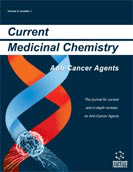Abstract
A major need in cancer chemotherapy is the availability of cancer cell-specific drugs. This paper discusses recent advances and perspectives in the field of selective drug recognition considering the key targets tyrosine kinases, DNA-topoisomerases and telomerase.
Keywords: drug-specificity, tyrosine kinase, topoisomerase, telomerase
Current Medicinal Chemistry - Anti-Cancer Agents
Title: Anticancer Agents: Towards the Future
Volume: 4 Issue: 5
Author(s): Manlio Palumbo
Affiliation:
Keywords: drug-specificity, tyrosine kinase, topoisomerase, telomerase
Abstract: A major need in cancer chemotherapy is the availability of cancer cell-specific drugs. This paper discusses recent advances and perspectives in the field of selective drug recognition considering the key targets tyrosine kinases, DNA-topoisomerases and telomerase.
Export Options
About this article
Cite this article as:
Palumbo Manlio, Anticancer Agents: Towards the Future, Current Medicinal Chemistry - Anti-Cancer Agents 2004; 4 (5) . https://dx.doi.org/10.2174/1568011043352731
| DOI https://dx.doi.org/10.2174/1568011043352731 |
Print ISSN 1568-0118 |
| Publisher Name Bentham Science Publisher |
Online ISSN 1875-5968 |
 2
2Related Articles
-
Elevated Levels of Soluble Fibrin in Patients with Thrombosis or a Pre- Thrombotic State
Vascular Disease Prevention (Discontinued) Cellular Delivery In Vivo of siRNA-Based Therapeutics
Current Pharmaceutical Design Epidemiology and Natural History of Alcoholic Liver Disease
Reviews on Recent Clinical Trials MICA Molecules in Disease and Transplantation, a Double-Edged Sword?
Current Immunology Reviews (Discontinued) Antiplatelet and Antileukocyte Effects of Cardiovascular,Immunomodulatory and Chemotherapeutic Drugs
Cardiovascular & Hematological Agents in Medicinal Chemistry Recent Patents and Patent Applications Relating to mTOR Pathway
Recent Patents on DNA & Gene Sequences Role of Unani Medicines in Cancer Control and Management
Current Drug Therapy DNA Copy Number Profiles Correlate with Outcome in Colorectal Cancer Patients Treated with Fluoropyrimidine/Antifolate-based Regimens
Current Drug Metabolism Isoform Characterisation, Heterologous Expression and Functional Analysis of Two Lectins from Vatairea macrocarpa
Protein & Peptide Letters Pgp and FLT3: Identification and Modulation of Two Proteins that Lead to Chemotherapy Resistance in Acute Myeloid Leukemia
Current Medicinal Chemistry The Expression Patterns and Clinical Significance of microRNAs in Liver Diseases and Hepatocellular Carcinoma
Current Pharmaceutical Design Microenvironmental Interactions in Chronic Lymphocytic Leukemia: Hints for Pathogenesis and Identification of Targets for Rational Therapy
Current Pharmaceutical Design Blocking HIV-1 Vif Restores a Natural Mechanism of Intracellular Antiviral Defense
Current Drug Targets - Immune, Endocrine & Metabolic Disorders Thiopurines in Inflammatory Bowel Disease - The Role of Pharmacogenetics and Therapeutic Drug Monitoring
Current Pharmacogenomics The PIK3CA Gene as a Mutated Target for Cancer Therapy
Current Cancer Drug Targets Use of Insulin and Insulin Analogs and Risk of Cancer — Systematic Review and Meta-Analysis of Observational Studies
Current Drug Safety Stem Cell Transplantation for Chronic Myeloid Leukemia (CML): Current Indications and Perspectives
Current Cancer Drug Targets The Inverse Relationship Between Cancer and Alzheimer's Disease: A Possible Mechanism
Current Alzheimer Research Patent Selections:
Recent Patents on Anti-Cancer Drug Discovery The mir-221/222 Cluster is a Key Player in Vascular Biology via the Fine-Tuning of Endothelial Cell Physiology
Current Vascular Pharmacology


















